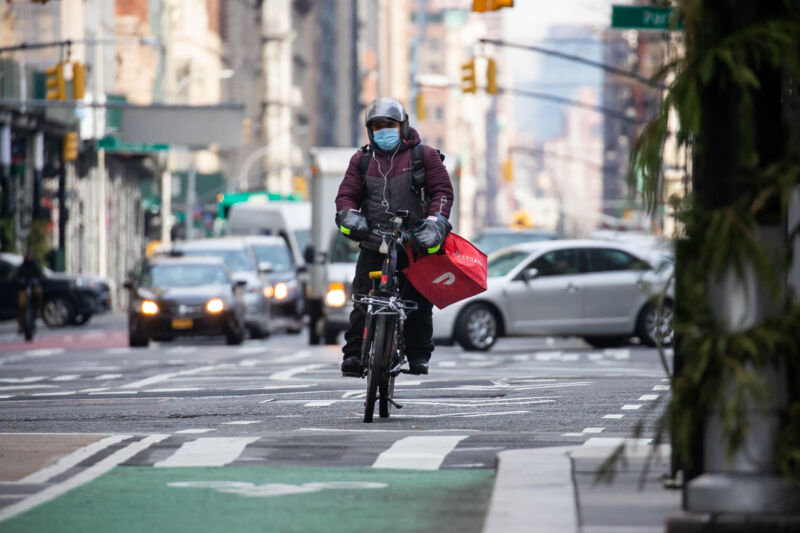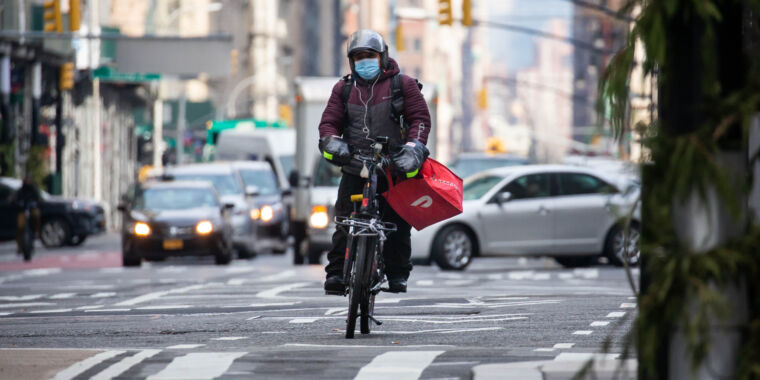
Michael Nagle/Bloomberg via Getty
A class action lawsuit alleges that DoorDash uses hard-to-determine delivery charges to systematically charge the delivery service’s iPhone users more than others.
The lawsuit (PDF), filed May 5 in the District of Maryland, came in. Prosecutor Ross Hecox, in addition to his two children and a suspected class of similar customers, succinctly defines DoorDash as an online marketplace with 32 million users and billions of dollars in annual revenue.
“Still, DoorDash doesn’t generate its revenue through heavy-handed tactics alone benefiting from struggling merchants and a significant number of immigrant drivers, but also through deceptive, misleading and fraudulent practices that illegally rob consumers millions if not billions of dollars a year,” the lawsuit adds. “This lawsuit details DoorDash’s illegal pricing scheme and is trying to hold DoorDash accountable for its massive consumer fraud, including one of the most vulnerable segments of society, underage children.”
Specifically, the lawsuit alleges that DoorDash misleads and defrauds customers
- Making the “Delivery Fee” seem related to distance or demand, even though none of it goes to the delivery person.
- Offering an “Express” option that implies faster delivery, but then changing the wording to “Priority” in the billing so that it is not tied to delivery times.
- Charging an “Extended Reach Delivery” fee that appears to be based on distance, but is actually based on a restaurant’s subscription level and demand.
- Adding an undisclosed 99 cent “marketing fee,” paid by the customer rather than the restaurant, to promote menu items that customers add to their carts.
- Obfuscating minimum order amounts associated with its “zero-fee” DashPass memberships and coupons.
- Generally manipulating DashPass subscriptions to look like substantial savings while the company appears to have reduced “engineering” costs.
One of the more interesting and provocative claims is that DoorDash’s fees, based in part on “other factors,” consistently charge iPhone users of the app more than Android users who place the same orders. The plaintiffs and their law firm ran a few tests of the DoorDash system, using different accounts to order the same food, from the same restaurant, at almost the exact same time, delivered to the same address, with the same account type, delivery speed, and tip .
Research from Panera, Chipotle and Chick-fil-A
In one test, an iPhone user who placed a Panera order was charged a 99 cent extended range fee, while an Android user — who, while technically irrelevant, was 15 miles from the delivery address — that wasn’t. In another test, identical Chick-Fil-A orders to an address resulted in the iPhone user – this time the one 15 miles away – paying an additional $1 in delivery charges. A third test on a Chipotle order, this time with both users in the same place, saw the iPhone user pay more for both delivery charges and extended range charges, an 8 percent increase over Android.
The plaintiffs ran four more tests, in which the iPhone user:
- Charged $5 more despite being closer to another Panera than the Android user
- Showed a “discounted” delivery cost despite paying $2 more than Android
- Charged more than they were for the same order then while logged into the Android device
- Received less discount with their DashPass account than another Android user with DashPass
“As the above tests show… DoorDash routinely charges iPhone users more than Android users for reasons unrelated to delivery and service charges,” the complaint alleges. “DoorDash likely charges iPhone users more because studies suggest iPhone users make more money than Android users,” it concludes, citing a blog post that rounds up some broad surveys and statistics surrounding iPhone versus Android users.
The various studies suggest that iPhones attract higher income buyers (SlickDeals, 2018), have a higher usage share among 18-34 year olds (Mercator Advisory Group, 2019) and spend twice as much on apps than Android users (Statista, 2022 ).
The plaintiffs are seeking $1 billion in damages for those who have “fallen prey to DoorDash’s illegal pricing” over the past four years. The lawsuit also includes allegations that DoorDash falsely allows children to enter into a contract with the company without proper vetting.
DoorDash, which raised $3.2 billion during its 2020 IPO, issued a statement to numerous media outlets in response to the lawsuit.
“The claims made in the amended complaint are baseless and simply baseless,” a DoorDash spokesperson said. “We make sure that fees are disclosed throughout the customer experience, including on each restaurant’s shop page and before they checkout. Building this trust is key, which is why most delivery orders on our platform are placed by repeat customers. We will continue to committed to ensuring our platform works even better for customers and will fight these allegations vigorously.”

